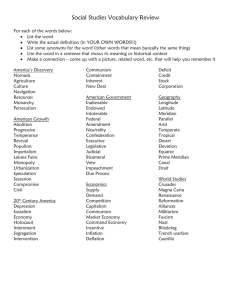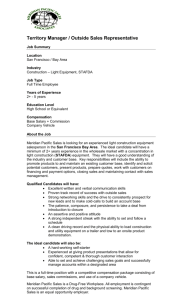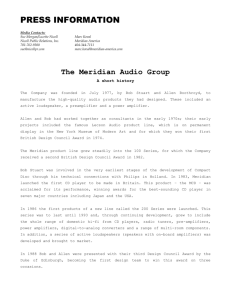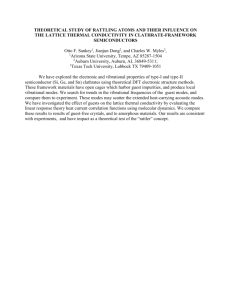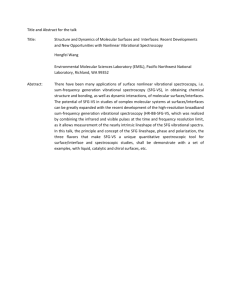TFH Exploring Color, Sound and Vibrational tools
advertisement
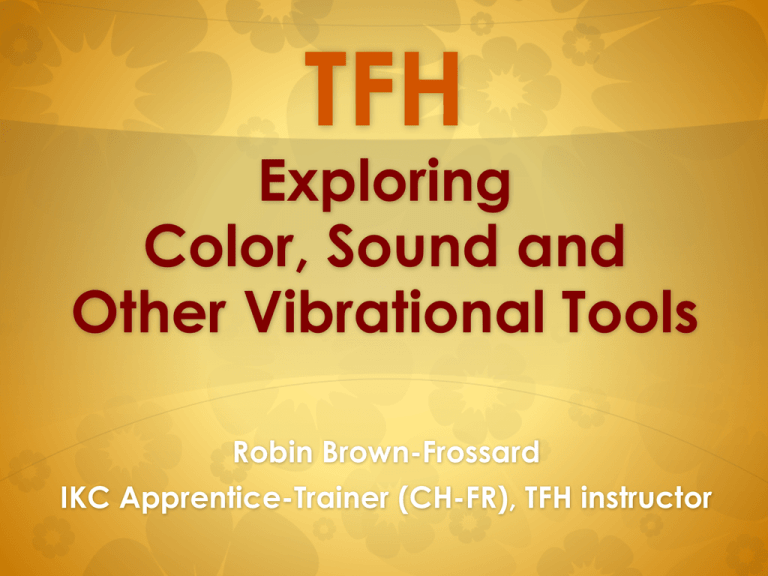
TFH Exploring Color, Sound and Other Vibrational Tools Robin Brown-Frossard IKC Apprentice-Trainer (CH-FR), TFH instructor How do hands-on vibrational techniques work? What are sources of vibrational influence? Hands Color Sound Plant remedies Crystals and Gemstones, … How can we easily incorporate these sources in our TFH balance? Meridian tracing and Acupressure points Protocol Specific considerations for each source Vibrations Dr. Royal Rife, Dr. Richard Becker, Dr. Richard Gerber, Bruce Tainio Dr. James Oschman & Dr. Terry Friedmann Why did the tomato turn red? Because it saw the salad dressing! Vibrations and Health The TFH Health Triangle Mental/Emotion al Biochemical Energetic « CHI » Structural The Human Body Health / Energy Royal Rife: every cell, tissue and organ has its own vibratory resonance Certain frequencies could prevent or neutralize the development of disease. Dr. Robert Becker MD: The human body has an electrical frequency. Much about a person's health can be determined by its frequency levels. Dr. James Oschman PhD: Each molecule, cell, tissue and organ has an ideal resonant frequency that coordinates its activities. By manipulating and balancing the vibratory circuits, complementary therapists are able to directly influence the body’ systemic defense and repair mechanisms. Dr. Richard Gerber MD: One of the best ways to change dysfunctional patterns in an energy body is to administer therapeutic doses of “frequency-specific subtle energy in the form of vibrational medicines.” Dr. Terry Friedman MD: Raising our vibrational frequency aids in “restoring health to the body, clarity to the mind and attunement to the spirit.” Bruce Tainio: The daytime frequency of a healthy human body vibrates in the range of 62 to 68 MHz. When a person's frequency drops below the optimum healthy range, the immune system is compromised Bio-electrical frequencies of essential oils are (52-320 MHz). As a Hertzian wave is generated and travels out from its source, it transfers energy to the objects it passes through. A high frequency raises the lower frequency, without lowering itself. The vectors of vibrational changes… Salty WATER …65% (weight) in the body 78% in the brain … EMPTY SPACE 99.999% (volume) … & SOLIDS 0.001% (volume) Vibrational Sources TFH & Use of Vibration Frequency Meridian Techniques Tracing or brushing meridians Meridian strengthening points Meridian sedation points Luo points Tapping points for chronic pain Protocol for selection of the vibration source Unlocking muscle – circuit locate the meridian correction point (muscle should lock when the person holds this point) Remove the person’s hand and substitute the various vibration sources, on the meridian correction point – the muscle will lock when the appropriate vibration source is used (in this order: hand, color, sound, essential oil) If there are several options that lock the muscle, use them one after the other. If it is your hand, muscle test with various hand positions and if appropriate, various movements Considerations: Hands You are your tool – personal development and energetic hygiene Different hand positions influence energy (mudras) Flat hand Perpendicular hand « Sword fingers » Closed lotus flower Mudras for the 1st to 5th chakras … Different movements ; spiral, 8, … Considerations: Colored light Use the TCM color correspondences Use the element’s color – darker for Yin and lighter for Yang Tracing or brushing the meridian Luo points Tapping points for chronic pain Use the colors of the elements of the specific Antique Shu points Strengthening points – use for the1st pair its parent’s color/for the 2nd its grand-parent’s color Sedation points – use for the1st pair its child’s color/for the 2nd its grand-parent’s color TCM color correspondences WOOD LV – forest green GB – light green FIRE HT, PC – ruby, burgundy SI, TB - red EARTH SP – yellow ST – lemon yellow METAL LU – light grey LI- white WATER KI – indigo BL - blue Considerations: Sound Active (person singing) or passive (external source) Various correspondences (notes of an octave, planets, …) – pick one that is linked to the meridians and stay with it (AP, Sales, …) If using a tuning fork: Following the meridian with the 2 prongs and not cut it by a perpendicular position of the prongs across the meridian path Placing it on acupressure points Tibetan singing bowls – striking or rubbing clockwise If singing, you can also sing with the person Considerations: Plant remedies No application of plant remedies on the body without appropriate training Remedy Skin Blood stream Chemical reactions Essential oils: the vibration frequency travels through the glass of the vial Tracing or brushing meridians: as you hold the glass vial, follow the meridian energy flow with the hand Acupressure points: set the vial on the point Essential oils in the higher frequency ranges tend to influence the emotions. EOs in the lower frequencies have more effect on structural and physical elements Choose one system of correspondences and stick to it Essential Oil Correspondences Michel Odoul & Elske Miles VC: Lavandula angustifolia, Citrus reticulata peel, Lippia citriodora VG: Laurus nobilis, Boswellia carterii, Cananga odorata LV: Citrus limonum peel, Rosmarinus off. verbenoniferum, Thymus vulg. thujanoliferum GB: Lippia citriodora, Cedrus atlantica, Ledum groenlandicum HT: Rosa damascena, Nardostachys jatamansis SI: Cinnamomum verum stick, Thymus vulg. Thymol, Satureja montana PC: Boswellia carterii, Origanum marjorana, Cananga odorata Essential Oil Correspondences Michel Odoul & Elske Miles TB: Pelargonium asperum CV Egypt, Citrus aurantium leaf, Citrus aurantium flower SP: Salvia scarlea, Ravensara anisata, Rosmarinus off. verbenoniferum ST: Ocimum basilicum, Pimpinella anisum, Artemisia dracunculus LU: Cinnamomum camphora, Malaleuca quinquenervia, eucalyptus radiata LI: Lavandula spica, Pinus sylvestris needles, Hysopus off. decumbens KI: Picea mariana, Gaultheria procumbens, Helichrysum italicum BL: Chamaemelum nobile, Cistus ladaniferus, Eugenia caryophyllata Several tools – one method Each vibrational tool is like a note on the piano No one note is « better, superior » to the others The beauty of the octave The unique expression of each note Vibrational tools can be our assistants when we feel that our personal vibratory frequency is low Robin Brown-Frossard Grand-Rue 1 1680 Romont/Switzerland robin.frossard@kinepro.ch +41 79 288 1909
